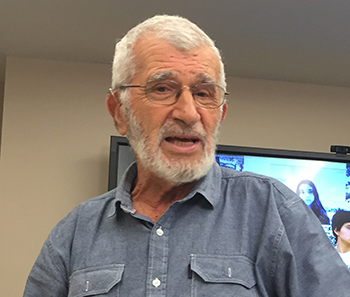
Sigmund Tobias
Holocaust survivors often visit USC Shoah Foundation – but not many come armed with ideas and research for developing a game to teach students about the Holocaust, like Sigmund Tobias did this September.
Tobias is a survivor of the Shanghai Jewish ghetto. In 1938, when he was six years old, he and his parents fled Nazi Germany and sailed to Shanghai, one of the only places in the world Jews could escape to without a visa. They lived there, battling food shortages, overcrowding and disease, until the end of the war. Tobias recorded his testimony for USC Shoah Foundation’s Visual History Archive in 1997 and wrote a memoir about his experiences, Strange Haven: A Jewish Childhood in Wartime Shanghai.
After the war, Tobias immigrated to the United States and became a professor and scholar of educational psychology. He has been published nearly 100 times and has been awarded $1.5 million in grants and contracts. Today, Tobias is Eminent Research Professor at SUNY Albany.
Tobias’s research focuses on learning from instruction, such as improving student learning by adapting instruction to student characteristics, understanding the importance of metacognitive monitoring of prior knowledge, and educational technology including computer games.
Tobias’s three-day visit to USC Shoah Foundation in September was threefold. He filmed an interview for the upcoming USC Shoah Foundation-produced documentary “Two Sides of Survival,” which is about the parallels between the Nanjing Massacre and the experiences of Jews in Shanghai during the Holocaust. Tobias also learned about USC Shoah Foundation’s educational work, and made his own case for why USC Shoah Foundation should develop an educational computer game about persecuted minorities.
Tobias freely admits that he’s no gamer. In fact, he says he only played a video game once in his life and quickly lost to his grandson. But he sees the vast potential for games to help students of all ages learn difficult concepts in a way that is challenging and interactive.
“I’m impressed with the capability of using games for instruction,” Tobias said. “It’s an immersive experience.”
Research has demonstrated that games are pro-social and increase altruistic behaviors in players, he added.
He envisions a game that would put the player in the position of a character who is a persecuted minority. The player would encounter different realistic situations that such a person might deal with, such as discrimination or the kindness of strangers. Hopefully, this would help students empathize with victims of persecution and learn about the steps that lead to genocide.
USC Shoah Foundation will consider Tobias’s ideas; in the meantime, he is passionate about games and hopeful that the Institute can be a leader in producing this kind of unique gaming experience.
“It seems like a rather more useful thing to do than a shoot-em-up game,” Tobias said.